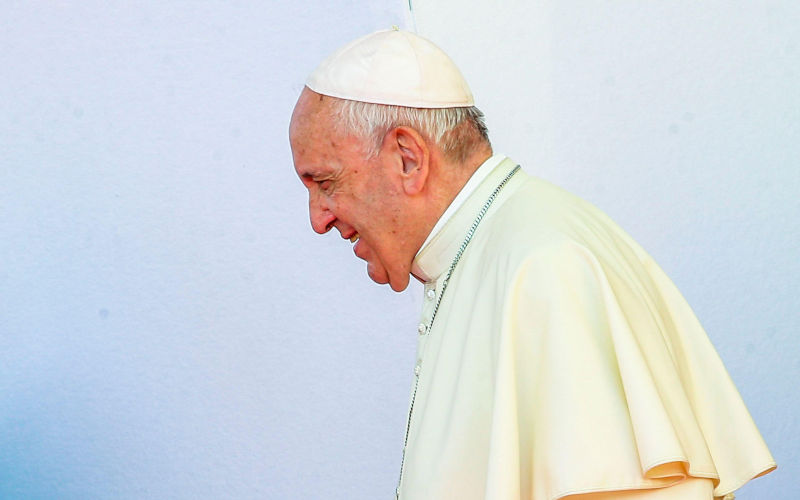Even in sickness, Pope Francis reached out to Gaza's Christians
April 25, 2025
For months, the pontiff spoke by telephone almost every night with people sheltering in a Catholic church in the battered enclave, a ritual he tried to keep up in the hospital.
Even as Pope Francis was hospitalised in the last months of his life, he still occasionally kept up what had been a near-nightly ritual: calling the hundreds of Palestinian Christians huddling in the only Roman Catholic church in the war-torn Gaza Strip.
Amid fear and bombardment, the Reverend Gabriel Romanelli, the Argentine parish priest at Holy Family Church in Gaza City, had received a call from Francis almost every evening last year to check in on the well-being of his flock in the devastated enclave.
It was an unusual amount of time for the spiritual leader of more than one billion Catholics to spend with such a small community. But Francis had long shown particular sympathy for Palestinian suffering, frequently calling for a ceasefire in Gaza.
The video calls generally lasted for a few minutes, Father Romanelli said. He said the calls had been less frequent after the pope became ill, but that they remained important for members of the community. Francis would inquire about the situation at the church, and Palestinians who had sought shelter there would ask for a blessing or voice a message that they hoped he would convey to world leaders.
“The evenings became known as the pope’s time,” Father Romanelli said. “People would gather, even the young or teenagers, to see him.”
Only a few hundred Palestinian Christians live in Gaza, which has been devastated by Israel’s military campaign against Hamas. Most of them are sheltering in two churches in Gaza City — the Catholic one and another that is Orthodox — hoping for safety within their walls. At least some have lost their homes in Israeli bombing.
During a war that Palestinian health officials say claimed the lives of more than 50,000 people in Gaza and in which telecommunications blackouts occasionally left the enclave mostly cut off from the rest of the world, the direct connection with Francis felt “existential”, Father Romanelli said.
The pope’s death, he said, “is very hard for us – for me, and also for the community, because we used to hear his voice every day".
Francis was an outspoken opponent of the conflict, repeatedly calling for a ceasefire and denouncing the humanitarian crisis in the enclave. He also met the families of Israelis taken hostage by Hamas in the deadly 7 October 2023, surprise attack that killed 1200 people and ignited the war.
“Among them are also many children; may they return to their families!” he said in a November 2023 address, referring to the more than 250 captives seized by Hamas.
In his final Easter sermon, which Archbishop Diego Ravelli delivered on the day before the pope’s death, Francis urged all sides in the war to “call a ceasefire, release the hostages and come to the aid of a starving people that aspires to a future of peace".
Francis’ sympathy for the Palestinian cause predated the war. In 2014, he visited Israel and the occupied West Bank, where he called for a “sovereign homeland” for Palestinians. He also became the first pontiff to refer to the occupied territory as “the State of Palestine".
During that trip, Francis made an unexpected stop at the Israeli-built separation wall that runs outside the Palestinian city of Bethlehem. Palestinians revile the concrete barrier as emblematic of the tight restrictions they endure under Israeli rule, while Israelis view it as an essential security measure.
Touching his forehead to the wall, Francis prayed, his head resting near where someone had spray-painted: “Pope, we need some 1 to speak about justice.”
“The image of him standing next to the wall and praying will forever be engraved in our memories,” Munther Isaac, a Palestinian Christian pastor in Bethlehem, wrote on social media on Monday.
The pontiff’s empathy for Palestinian suffering occasionally put him at odds with Israel’s Government. After Francis appeared to label Israeli airstrikes in Gaza as “cruelty” in an address last December, the Israeli foreign ministry accused him of ignoring “the true and factual context of Israel’s fight against jihadist terrorism".
After Francis’ death, Isaac Herzog, Israel’s largely ceremonial president, issued a statement mourning the religious leader. Prime Minister Benjamin Netanyahu of Israel did not comment, and a spokesman for Netanyahu declined to say whether the prime minister would attend the pope’s funeral on Saturday, which falls on the Jewish Sabbath.
Ibrahim Jahshan, an Orthodox Christian from Gaza City, said Francis’ death was a loss for all Palestinians regardless of their faith. He said many in Gaza’s Christian community felt they had known him “as both a pope and a human being".
“All of us will miss him,” Jahshan said.
Republished from The New York Times, 22 April

